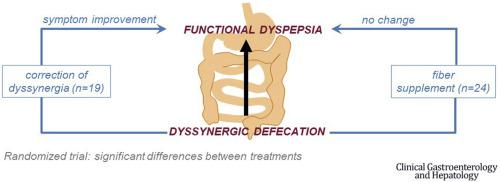Clinical Gastroenterology and Hepatology ( IF 11.6 ) Pub Date : 2019-12-04 , DOI: 10.1016/j.cgh.2019.11.048 Jose-Walter Huaman 1 , Marianela Mego 1 , Alvaro Bendezú 1 , Hugo Monrroy 2 , Sara Samino 3 , Anna Accarino 2 , Esteban Saperas 4 , Fernando Azpiroz 2

|
Background & Aims
Patients with functional dyspepsia are believed to have increased sensitivity of the gastrointestinal tract, and some also have functional constipation. We investigated whether in patients with functional dyspepsia, correction of dyssynergic defecation can reduce postprandial fullness.
Methods
We performed a parallel trial at 2 referral centers in Spain, from June 2016 through January 2018 of 50 patients who fulfilled the Rome IV criteria for functional dyspepsia with postprandial distress syndrome and functional constipation and dyssynergic defecation. After a 2-week pretreatment phase, the patients were randomly assigned to groups that learned to correct dyssynergic defecation (2–3 sessions of biofeedback combined with instructions for daily exercise; n = 25) or received dietary fiber supplementation (3.5 g plantago ovata per day; n = 25) for 4 weeks. The primary outcome was change in postprandial abdominal fullness, measured daily on a scale of 0–10, during the last 7 days treatment phase vs the last 7 days of the pretreatment phase. Anal gas evacuations were measured (by an event marker) during the last 2 days of the pretreatment vs treatment phases.
Results
Biofeedback treatment corrected dyssynergic defecation in 19/25 patients; corrected dyssynergic defection reduced postprandial fullness by 22%±1% in these patients (P < .001), and reduced the number of anal evacuations by 21%±8% (P = .009). Fiber supplementation did not reduce postprandial fullness or anal evacuations (P ≤ .023 between groups for both parameters in the intent to treat analysis).
Conclusions
Diagnosis and correction of dyssynergic defecation reduces dyspeptic symptoms by more than 20% in patients with functional dyspepsia and associated constipation. Dietary fiber supplementation does not reduce symptoms in these patients. ClinicalTrials.gov no: NCT02956187
中文翻译:

在一项随机试验中纠正排便障碍,而不是补充纤维,减少便秘患者功能性消化不良的症状。
背景与目标
功能性消化不良的患者被认为胃肠道的敏感性增加,有的还伴有功能性便秘。我们调查了在功能性消化不良患者中,纠正排便不协调是否可以减少餐后饱胀感。
方法
我们于 2016 年 6 月至 2018 年 1 月在西班牙的 2 个转诊中心对 50 名符合罗马 IV 标准的功能性消化不良伴餐后窘迫综合征和功能性便秘和排便障碍的患者进行了平行试验。经过 2 周的预处理阶段后,患者被随机分配到学会纠正协同排便障碍的组(2-3 次生物反馈结合日常运动指导;n = 25)或接受膳食纤维补充剂(3.5 g 车前子卵 /天;n = 25) 4 周。主要结果是餐后腹部饱胀度的变化,每天在 0-10 的范围内测量,在治疗阶段的最后 7 天与预处理阶段的最后 7 天相比。
结果
生物反馈治疗纠正了 19/25 患者的协同排便障碍;纠正的协同失调缺陷使这些患者的餐后饱腹感降低了 22%±1% ( P < .001),并使肛门疏散次数减少了 21%±8% ( P = .009)。补充纤维并没有减少餐后饱腹感或肛门排空(治疗意图分析中两个参数的组间P ≤ .023)。
结论
在功能性消化不良和相关便秘患者中,排便协同障碍的诊断和纠正可使消化不良症状减少 20% 以上。补充膳食纤维并不能减轻这些患者的症状。ClinicalTrials.gov 编号:NCT02956187













































 京公网安备 11010802027423号
京公网安备 11010802027423号